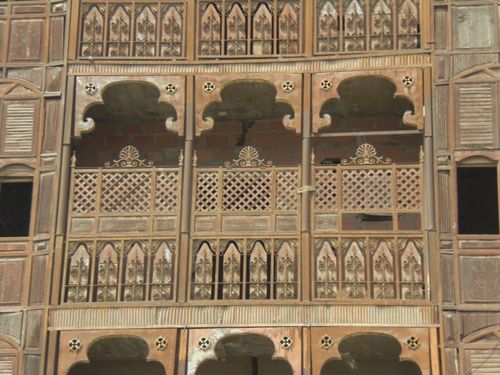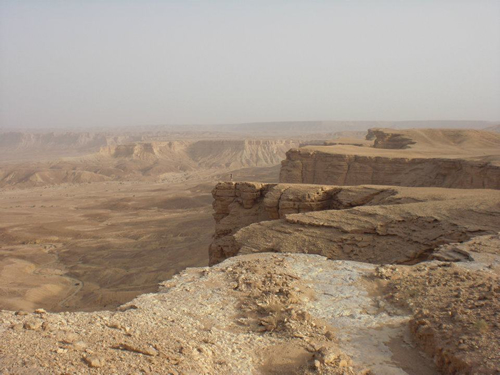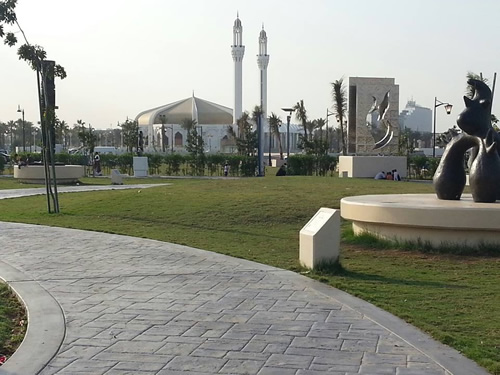Teaching English and Living in Saudi Arabia as a Woman
Article and photos by Kim Lyon
9/2014. Resources updated 8/2/2023
by Transitions Abroad

|
|
Architecture in the historic center of Balad Jeddah in Saudi Arabia..
|
“Are you joking?” was the common response when I said Saudi Arabia was my next work destination. Friends and family know me as an independent female who prizes her freedom. Saudi was not an obvious choice.
After experiencing a sham TEFL job in Sri Lanka, my bank account was not looking too healthy. Having worked in the UAE and Oman before, I was not a stranger to the Islamic culture of the Middle East. Still, Saudi Arabia seemed like the final frontier. I applied to King Saud University in Riyadh through a recruiter based in London. Within a matter of weeks, I’d been interviewed, was offered a position as an ESL teacher, sent my passport back to London for a visa, and had been issued a flight.
But there was a sadness to leaving the tropical beauty of Sri Lanka and its cheerful people. On my Saudi Airlines flight, I do not recall seeing any other single white women, and I was moved into business class. The plane was full of Sri Lankans going to Saudi Arabia as domestic workers. When we landed in Riyadh, their brightly colored dresses were quickly covered by black abayas. It is a legal requirement for women to wear an abaya. Imagine my horror and fear when my airport pick-up did not provide me with an abaya and instead silently ushered me to the back seat of his car.
Arrival in Saudi Arabia and Culture Shock

|
|
The edge of the world in near Riyadh.
|
One of the first surprises of Saudi was the temperature. It was December and it was cold. I was delivered to a furnished apartment, where I huddled under two blankets and awaited instructions from my employer. Nothing was clear. The next day I was told to be ready to go the Education Experts office. Some other foreigners appeared in the lobby and we waited together in a strange sort of suspense. Eventually, two minibuses arrived, one for females and one for males.
At the office, I was immediately issued with an abaya and given an outline of my duties. Then I went to the university. It was a satellite branch, a relatively small building with few windows. There were around 90 other Western teaching staff. It is not uncommon for teachers to break their contracts in Saudi Arabia, and I was thrown into a classroom immediately. The saving grace was having a partner teacher who showed me the ropes.
Adjusting to Working and Teaching in a New Culture
After the hard-working and cheerful attitude of Sri Lankan students, Saudi student attitudes were a bit of a shock. They are not always used to having foreigners as teachers. It took a fight to earn their respect in the classroom. They are finding their way with different methods of instruction and learning. Although some women do work in the Kingdom, the majority do not. The motivation for attending university has more to do with social reasons than career ambitions. This took me a while to get my head around.
Another difficulty was adjusting to teaching taboos. Due to the strict Islamic culture, it is not appropriate or acceptable to talk about religion, politics, or relationships between the sexes. While our textbooks were designed for a Middle Eastern audience, we were issued a list of pages and tasks to skip.
Although adjusting to these standards and the students was hard, it was not impossible. I built rapport with my students by being personable, while guiding them as a collective rather than individuals. Team activities generally were far more fruitful than demanding every person do it by themselves.
The support and rapport from my colleagues was incredible. Saudi attracts a lot of tough, smart women, as well as a few eccentrics thrown into the mix. Fantastic friendships grew out of working in such an intense climate. I made friends outside of work by attending the "hash," a weekly hike out in the desert, and an Arabic course in the Diplomatic Quarters. I went to parties at various embassies and compounds. In its own roundabout way, the lifestyle was glamorous at times. On the one hand, some foreign women feel oppressed about not being able to drive, but on the other it is perhaps the only time in life when we can be chauffeured around in fancy cars.
Living in and Enjoying Saudi Arabia

|
|
Art park in Jeddah.
|
Before the summer holiday I took a weekend break to Jeddah, where I met a Turkish Professor of Tourism, whom I later married. After that summer I returned to a different job in Jeddah. It is a much more relaxed city than Riyadh, modern, attractive, yet with a charming old historic center. In Riyadh, I would not think to wander around alone or go to a restaurant with a male, while in Jeddah it is possible. The Red Sea is a huge plus and many happy weekends can be spent snorkeling and diving.
There are thousands of expats from all over the world in Saudi Arabia. I also don’t know anywhere else in the world where one can find such good payment compensation packages as an ESL teacher. The trick is to inform yourself of the rules of the country. If you don’t agree, or cannot tolerate the cultural differences, it is probably best not to go. It is not your job to change their cultural traditions, but rather an opportunity as a woman to contribute to higher standards in female education.
|
For More Information
Teaching and Working Requirements
-
You must have a TEFL Certificate from a well-regarded institution
-
You must be a citizen from a native English-speaking country
-
You must have teaching experience prior to arriving
-
You must have an advanced degree (beyond high school)
-
If you wish to teach at universities, as in many countries, you must have a license
As Michael G. Hines notes: "Another country that offers impressive remuneration for workers is the Kingdom of Saudi Arabia, though an employment visa is only valid for one year. In order to be granted an employment visa, an applicant has to have the following: a completed visa application form, a passport valid for at least six months, passport size photo with a white background, reference note with number and date of residence visa, original sponsor letter, copy of the signed employment contract, certified and notarized copies of the applicant’s university diploma, medical report proving that the applicant does not have a contagious disease (specific forms apply); and a police report with information on the applicant’s criminal record, if there is any. In addition, if you are transferring from a position within Saudi Arabia, then you will need a release letter from your previous employer"
Please contact Saudi Embassies and Consulates for the latest on working and teaching requirements for your native English-speaking country of origin.
|
Kim Lyon has lived and worked in the U.K, the Czech Republic, the U.A.E, Oman, Canada, Hong Kong, Sri Lanka and Saudi Arabia. Travel is in the family genes.
|
